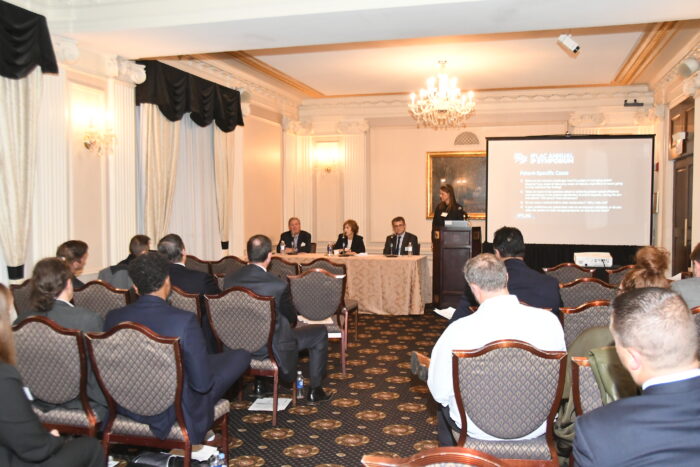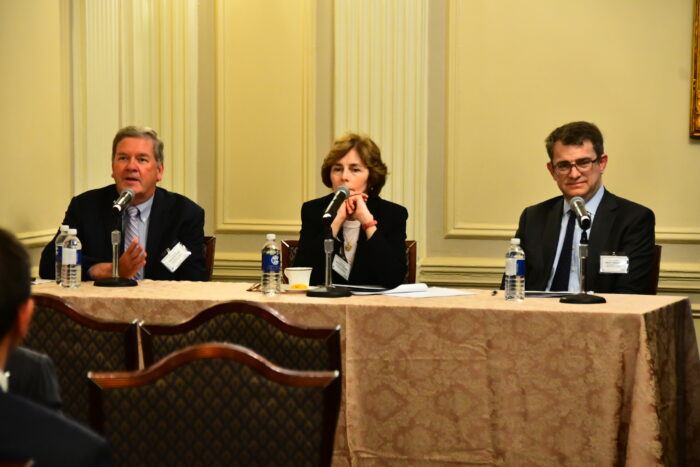IPLAC and the Symposium Committee held the annual IP Symposium on November 3, 2022. Julie Langdon of Vedder Price, Jim Muraff of McDonald Hopkins, Matt Marrone of McAndrews, Held & Malloy, and Kwanwoo Lee of UnitedHealth Group served as Co-Chairs and Michelle Kouba of Michael Best & Friedrich, Stephen Kudla of Marshall Gerstein & Borun, and Casey Mangan acted as vice chairs.
The first session, What’s New in Patent Law, included Ryan Phelan of Marshall Gerstein & Borun, Robyn Bowland of Irwin IP, and Dunstan Barnes of McAndrews, Held & Malloy, and was moderated by Erin Fox of Illinois Tool Works. Ryan spoke about artificial intelligence and the interplay of 35 U.S.C. 101. Robyn discussed the impact of Biogen Int’l GMBH v. Mylan Pharms. Inc. and Novartis Pharms. Corp. v. Accord Healthcare, Inc. on 35 U.S.C. 112. Finally, Dunstan spoke about how to use design patents to protect against counterfeit goods. Each speaker gave various practice tips in view of their particular topics.
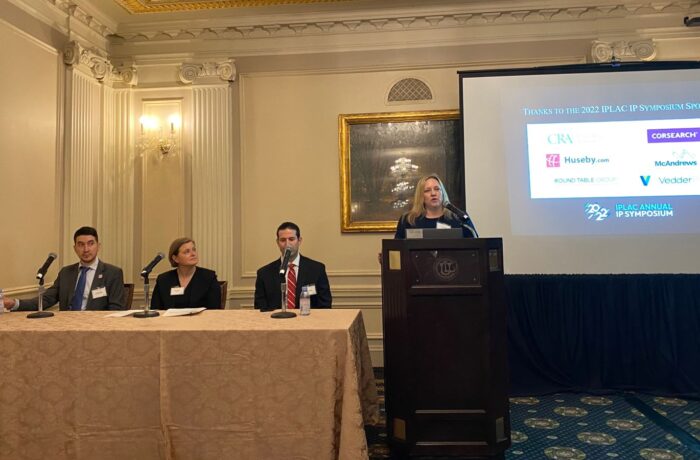
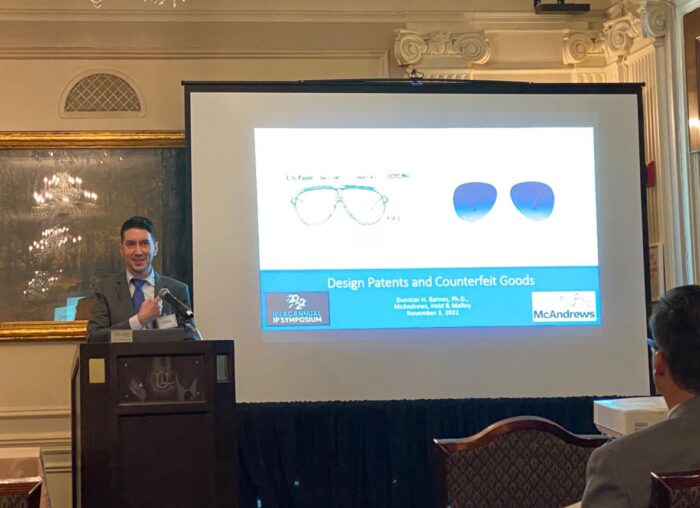
The second session, the TTAB Chat, included Judge Cindy Greenbaum, Administrative Trademark Judge, Trademark Trial and Appeal Board, Jennifer Elgin, Interlocutory Attorney, Trademark Trial and Appeal Board, and was moderated by Virginia Marino of Crowell & Moring. The discussion can be summarized as follows: various roles of the TTAB were discussed, including judges and interlocutory attorneys, and their day to day activity. TTAB judges work in panels of 3, while interlocutory attorneys work individually on assignments from their managing interlocutory attorney. Frequent issues, including procedural issues, are addressed by TTAB judges and interlocutory attorneys. Some advice offered by the panel when arguing at the TTAB included: (1) always follow the TTAB procedural rules because failure to do so could result in a loss even if you have a decent case, (2) try to compromise with the opposing parties to simplify the issues in the case, (3) don’t make a new argument or present any evidence that is not in the record, and (4) consider whether a non-dispositive motion is going to resolve any essential issues before filing it.
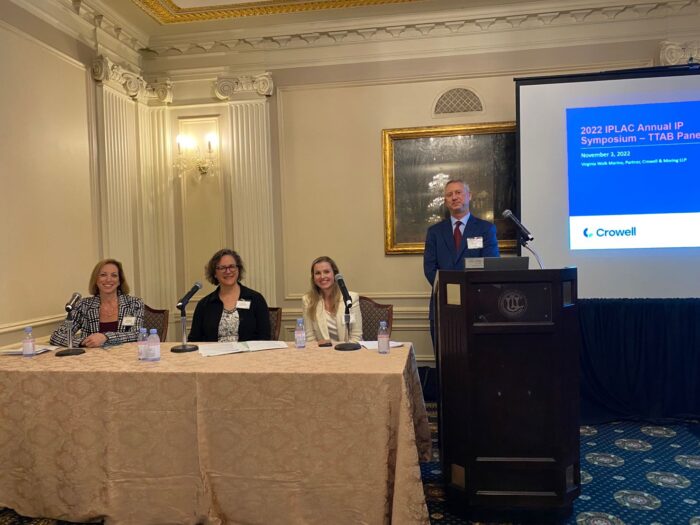
The third session, Legal Ethics Trends for 2022 and Beyond, included Mary Andreoni, Ethics Education Senior Counsel, from the Attorney Registration and Disciplinary Commission. Mary provided various guidance on the most common issues which result in disciplinary action, including misappropriation of trust and other funds, trouble within the law firm, incivility, lawyer burnout and impairment, and lawyer mobility. She gave various examples of investigations and formal prosecutions resulting in disciplinary sanctions.
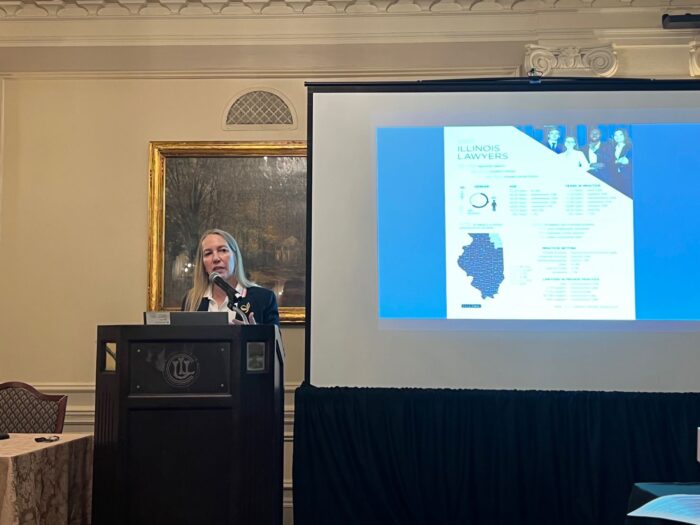
The last session, the Judicial Panel, included Chief Judge Rebecca R. Pallmeyer, U.S. District Court for the Northern District of Illinois; Judge Thomas M. Durkin, U.S. District Court for the Northern District of Illinois; and Judge Gary S. Feinerman, U.S. District Court for the Northern District of Illinois, and was moderated by Kara Cenar, Greensfelder Hemker & Gale, P.C. The judges expressed their views on how the pandemic has affected federal court practice, particularly whether the trends we saw during the pandemic, such as telephone status hearings would continue. The judges described their various preferences in learning about the technology at issue in patent cases and reminded the audience that they do not have science degrees and the onus is on the lawyer to describe the invention in a clear and understandable manner. The judges also discussed their views on motion practice, and their approach to motions. Judge Durkin described his practice of having an in-person meeting before the parties file Motions for Summary Judgment. The judges also shared that they often have fully read the briefs and have made an initial decision, but, with the exception of Judge Durkin who does not requires hearings, the Judges generally want to hear arguments to determine whether there is something more they need to consider.
